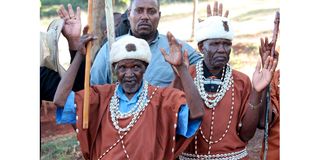UN Women, traditional leaders partner to end harmful African traditions

Kikuyu elders conducting prayers at Uhuru Park in Nairobi at a past event. The UN Women has partnered with traditional leaders from Africa to end harmful practises that target women and girls.
What you need to know:
- Through the Council of Traditional Leaders of Africa, UN Women seeks to protect women and girls’ rights.
- Traditional leaders are key stakeholders in eradicating violence against women and girls as they have a greater chance of influencing societal norms.
The UN Women has initiated a partnership with traditional leaders to fight human rights abuses against women and girls in Africa.
The UN Women Africa office hopes to end harmful practices like female genital mutilation (FGM), child marriages and gender-based violence (GBV) against women and girls.
Through the Council of Traditional Leaders of Africa (Cotla), the UN agency seeks to protect women and girls’ rights so that they can live in a violence and discrimination free society.
UN Women says the harmful practices are caused by deep rooted gender inequality, patriarchal beliefs and harmful social norms, poverty and lack of education and awareness.
Speaking during a virtual event dubbed Partnerships for Change, Jaha Mapenzi Dukure, UN Women Regional Goodwill Ambassador for Africa, said traditional leaders are key stakeholders in eradicating violence against women and girls as they have a greater chance of influencing societal norms and practises.
His Royal Highness Chief Chamuka a HeforShe champion from Zambia, said passion for equity between the two genders drove him to become a gender equality champion.
He noted that equity can help in eradicating GBV and other vices like child marriages and teenage pregnancies, which are detrimental to national development.
Social norms
“Young girls are not supposed to be carrying babies, but are supposed to be in school and we must do all we can to ensure that happens,” Chief Chamuka said.
Princess Sekhothali Seesio from the Kingdom of Lesotho underscored the need to have traditional leaders become responsible for their actions and those around them.
Africa has led the effort to engage with cultural and traditional community leaders in ending harmful practices impacting women and girls. Evidence-based engagement has proved in some countries that working with community leaders is essential for effectively changing social norms.
Traditional leaders across Africa play significant roles as influencers and custodians of cultural practices within communities and are seen as catalysts for change against child marriage and FGM.
As attention grows to the slow progress on ending the harmful traditional practices, gender experts say traditional leaders have a critical role in shifting these deep-rooted cultural beliefs.
Last year, Cotla steering committee members from six African countries met in Naivasha to discuss plans and actions to end violence against women, specifically child marriage and FGM.
The group seeks to drive the transformation and eradication of negative cultural practices, customs and traditions.
The meeting reviewed Cotla’s strategic approach and developed a work plan with key results that respond to the network’s commitments, accountability, and reporting mechanisms.
Child marriages
It also provided a range of opportunities for traditional leaders to exchange strategies they use, and discuss challenges that would guide how they achieve the change.
Already, the program has started bearing fruit with cases of FGM and child marriages being stopped in numerous countries.
Details from Cotla show that in Malawi, chiefs working with police, mother groups and child protection workers, have so far dissolved 1,893 child marriages.
In Liberia, traditional chiefs in the 11 FGM practicing counties, have signed a Seven County Policy banning the harmful cultural practice.
In Zimbabwe, the collaboration of traditional leaders supported a change in the use of cattle from an asset used as part of the bride price, into a sanction imposed as penalty when one breaks the law by marrying off a child.
Traditional leaders in Mozambique have agreed on an action plan at a national forum, to address child marriage and GBV in their communities.
According to Unicef, at least one in three young women in Africa are married before they turn 18.
The UN agency also notes that although there are signs of progress in changing attitudes toward FGM, the practice remains a major problem across many countries on the continent.
About 200 million girls and women have been subjected to the vice.





